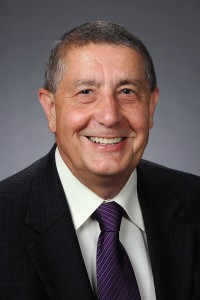Initiative for a Carbon Negative Economy
Marty Spalding
 Dr. Spalding, Professor, received a B.S. in both Environmental Science and Biochemistry in 1974, and an M.S. in Botany in 1976, from Washington State University. He received his Ph.D in Plant Physiology from the University of Wisconsin in 1979. Dr. Spalding completed a postdoctoral program at the University of Illinois in 1982 and was a visiting postdoctoral fellow at The Australian National University later that same year. In 1982-1983 Dr. Spalding completed a postdoctoral program at Michigan State University. He joined Iowa State University in 1984 as an Assistant Professor. Dr. Spalding served as chair of the Interdepartmental Plant Physiology program at ISU from 1992 until 2000. In July 2003, he assumed the position of Chair of the GDCB Department. In July 2011, he became Associate Dean for Research and Graduate Studies in the College of Liberal Arts and Sciences.
Dr. Spalding, Professor, received a B.S. in both Environmental Science and Biochemistry in 1974, and an M.S. in Botany in 1976, from Washington State University. He received his Ph.D in Plant Physiology from the University of Wisconsin in 1979. Dr. Spalding completed a postdoctoral program at the University of Illinois in 1982 and was a visiting postdoctoral fellow at The Australian National University later that same year. In 1982-1983 Dr. Spalding completed a postdoctoral program at Michigan State University. He joined Iowa State University in 1984 as an Assistant Professor. Dr. Spalding served as chair of the Interdepartmental Plant Physiology program at ISU from 1992 until 2000. In July 2003, he assumed the position of Chair of the GDCB Department. In July 2011, he became Associate Dean for Research and Graduate Studies in the College of Liberal Arts and Sciences.
My research interests include photosynthetic carbon metabolism and metabolic regulation of gene expression in plants and photosynthetic microbes. A particular focus of my research has been understanding the acclimation response of microalgae to changes in CO2 availability, using Chlamydomonas reinhardtii as a model system. Understanding this acclimation response, includes both understanding how C. reinhardtii recognizes and transduces changes in CO2 availability, as well as the functional aspects of the acclimation response, especially the CO2-concentrating mechanism (CCM) induced by limiting CO2. Recently, we have demonstrated that C. reinhardtii exists in at least two limiting CO2 acclimation states determined by the CO2 concentration, a novel characteristic with regard to nutrient scavenging acclimation. These two limiting CO2 acclimation states, the low (~0.4%-0.03%) CO2 state and the very low (less than 0.01%) CO2 state are clearly defined in a classic inorganic carbon (Ci) transport deficient mutant, pmp1/ad1 that grows normally in high (greater than 0.5%) CO2 or in very low CO2 but dies in low CO2. We recently determined this mutant to be defective in LCIB, one member of a small gene family apparently restricted to the green algae. Thus our current work in this area focuses on the Ci transport function of the C. reinhardtii CCM, an area where virtually no real progress was made prior to the recent completion of the C. reinhardtii genome sequence. In addition to continuing work on the LCIB protein family, my lab also has been using RNAi technology to investigate potential Ci transporters, including HLA3/MRP1, a member of the MRP family of ABC transport proteins.